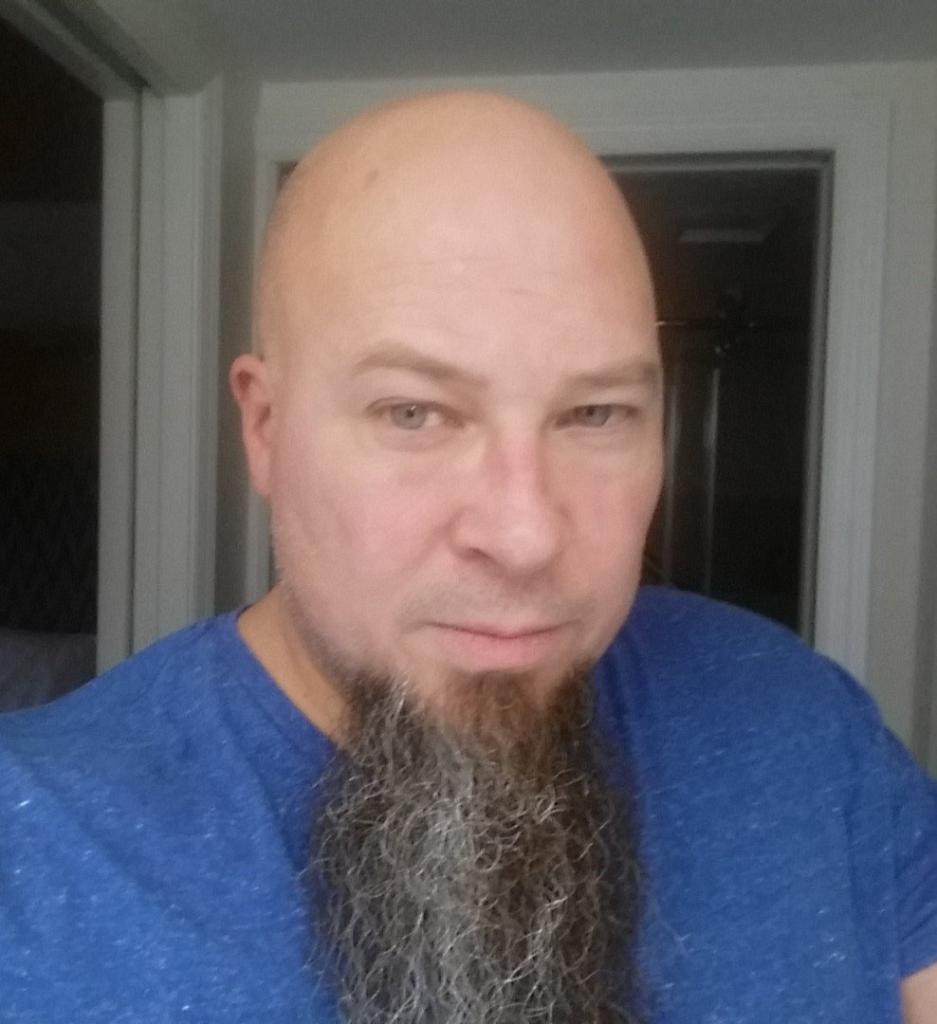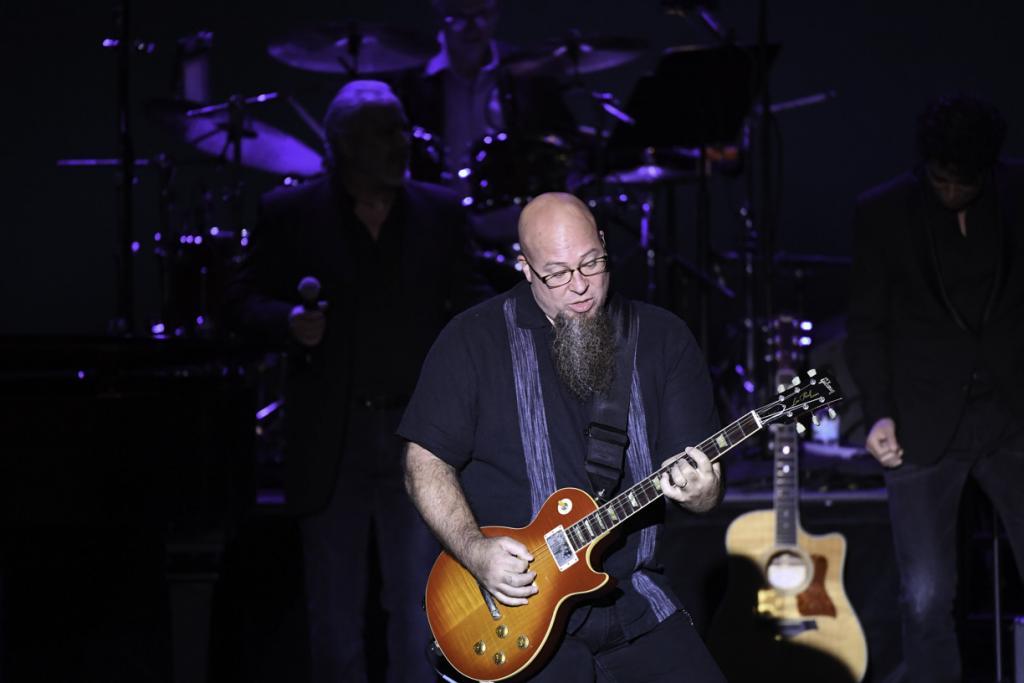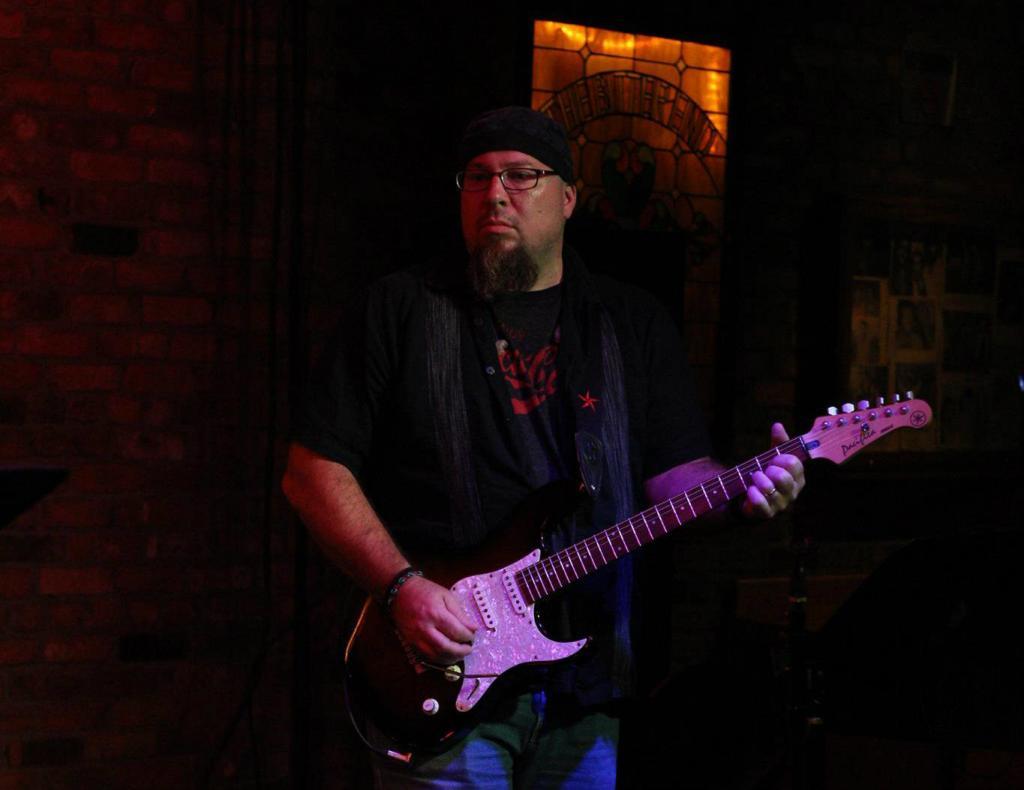Michael Wilson is an accomplished guitarist to say the least. Have you seen him perform? Possibly. Have you heard him play? Definitely!

Wilson has worked closely with the Trans-Siberian Orchestra (for which he was awarded a gold and platinum record), as well as veteran producers Jack Douglas (Aerosmith, John Lennon) and Paul O’Neill (Trans-Siberian Orchestra, Aerosmith). In 2005, he joined Neil Berg’s 100 Years of Broadway, where he’s toured across the country as well as internationally, backing Broadway stars such as six-time Tony Award winner Audra McDonald, Stephanie Block (Wicked, The Mystery of Edwin Drood), Rob Evan (Jeckyl & Hyde, Les Miserables, Trans-Siberian Orchestra), and Tony Vincent (American Idiot, NBC TV’s The Voice), among many others. He has appeared in several musicals including the Broadway revival of the hit musical Smokey Joe’s Café, The 12, Spun, Calling All Kates, and is a featured performer in 50 Years of Rock and Roll and Broadway Rox.
As both a stage musician and much sought after session artist, Wilson is highly in demand. Why? The answer is simply he is just that good. He supplied us with more complicated answers as we spoke about his career.
JD Nash for American Blues Scene:
Right from the beginning Mike, when did you get started?
Michael Wilson:
I got a guitar for Christmas when I was eight. One of my older brothers was already a musician at that point and I would bang around on a toy guitar. I was always a ridiculous ham, and I think my parents thought, ‘Hey, maybe this kid has a little natural ability,’ so they got me my first guitar. I tried to figure it out for myself but couldn’t quite make heads or tails of it, so when they asked if I wanted to take some lessons, I said, ‘yeah,’ and that was it.
So it was your older brother that first influenced you?
Well, my brother was thirteen when I was eight, and I would hear this cool stuff coming out of his bedroom. Sometimes, he’d hear something and go, ‘alright, Mike’s gotta hear this.’ He would literally sit me down in front of his stereo and drop the needle on stuff. I can still remember real specific things like in 1978 when ‘Van Halen’ came out and he said ‘listen to this,’ a dropped the needle on “Eruption.” I remember my reaction was, ‘that can’t be a guitar. That has to be a synthesizer,’ and him shaking his head and going, ‘nope.’
Was that the first piece of music that actually got in your head and made you want to play?
Actually, I remember being four or five years old and my brother is listening to the first Beatles record. I still remember Paul counting off 1, 2, 3, 4 and kicking out ‘she was just seventeen.’ I remember vividly sitting on the floor in front of the stereo and listening to the Beatles for the first time, and this was after they had already broken up, but they were new to me. As far as the first song that made me want to play? “Stairway To Heaven,” the most overplayed song on FM radio to me is the perfect rock song. So, it was Jimmy Page that first made me want to be a guitar player. I’d like to thank him because I wouldn’t be who I am without him.
So you would say rock and roll has been your most influential genre?
Yeah. Without a doubt. I’ve always kind of thought that I was born in exactly the right time. I was born in ’67, so by the time I started playing it was the mid-70s. In my mind, looking back, that was the height of rock guitar. Then ’78 came around and Van Halen changed everything. If you were a kid, just starting out, Eddie made it kind of impossible to play. I mean, at the time I was listening to AC DC, and other reasonably simple, blues-based, rock stuff. It took years before I decided I was ready to play some Van Halen. But it was a great time to be a guitar player as a kid. There were so many great things.
How did you get involved with Trans-Siberian Orchestra? I mean, were you a theater kid too?
Never. Being a musician is hard. There are times when it’s great and there are times when things aren’t going so well. So after college I got a job in artist management working for David Krebs who is a legendary producer. I was working for him in the mid-90s managing record producer Paul O’Neill who, well, Trans-Siberian was his brain child. Working directly for Paul, I was there at the ground floor. I spent a lot of time in the studio with those guys, so I was lucky to be there in the beginning. The great thing is I’m still friends with a lot of those guys and still work with a lot of them. We also managed Savatage. In fact Chris Caffery and I are neighbors.
Did you ever tour with them?
No. I had left the organization before they started touring. Their first album was really just a studio project. It probably took two years before they started touring. I probably left at the wrong time (laughs), but at the time it was the right move for me. I couldn’t be happier for all the success they’ve had and I’m proud to have been a tiny part of that.
Now, you’ve been pretty successful yourself. 100 Years of Broadway, that tours all over the country right?
Yeah, it’s been going on for like 20 years. It’s crazy. I’ll tell you how I got that gig. I’m a classically trained player, and I’m pretty well-rounded, but if you ask me what kind of guitar player I am – I’m a rock guy. But, at the time, like 15 years ago, the guitar player for ‘100 Years of Broadway’ was Alex Skolnick. What can you say? Skolnick is amazing.
Anyway, I was playing in a band with the drummer from ‘100 Years of Broadway,’ and Neal Berg sat in on keyboards one night. I had no idea who this guy was. He said, ‘hey man, I like the way you play guitar,’ and that was that. So the following Tuesday, the drummer calls me up and says, ‘remember me telling you about that 100 Years of Broadway thing?’ I said, ‘I probably was listening, but yeah.’ (I knew nothing about Broadway or any of that stuff). He said, ‘we’re playing Saturday, we need a guitar player and you’re gonna do it.’ I said, ‘no, I’m not.’ He said, ‘yes you are. Get over to my house right now and pick up the charts. You’re playing the show.’
I was actually their fourth choice (laughs), but I thought I’d do it one time. Once I played the show, I thought this is pretty cool. The money is good. I think I could do this. I didn’t hear back from them for two years. In the meantime, I had gotten involved in one of Neal’s rock musicals called ‘The 12.’ That was the next step in the evolution for me. Around that time Skolnick got way to busy with other stuff and suddenly I was the guy.
Then about four or five years ago, Neal says, ‘I kinda want to do 100 Years of Broadway thing but I want to do a rock version. You know every single rock song ever written anyway so…’ I said, ‘great!’ So now ’50 Years of Rock and Roll’ has just been getting bigger and bigger, and I started doing more Broadway stuff, and I constantly ask myself, ‘how the hell did I end up here?’
We just started doing Part 3, and in case you’re not familiar with it, ’50 Years of Rock and Roll’ is a chronological history of rock n roll starting with the blues, and goes up to the early 80s when MTV destroyed rock n roll.
So you say it all starts with the blues?
Yes, the show literally starts with Robert Johnson’s “Crossroads”. It’s obviously done a bit differently but is still traditional blues.
I think for most people our age, the first version of “Crossroads” that we ever heard wasn’t Johnson’s either.
Oh yeah, it was Clapton. I mean you heard Clapton, or any of those British Invasion guys and then you realize that they mention, ‘oh, that was Muddy, or that was Robert Johnson, or it’s Lead Belly,’ and I didn’t know who any of those people were. I just wanted to know where all these guys got that stuff.
Out of all the stuff you’ve done so far, what has been your favorite?
That’s hard. In all the years I’ve worked with Neil, he’s never once said, ‘no. Don’t do that.’ Since day one he’s had absolute trust that I was going to play the right thing. In ’50 Years of Rock and Roll,’ I get to play in all those particular styles. I mean if you’re in a metal band, you can’t just whip out some Chet Atkins. You can try (laughs) but I wouldn’t recommend it. But in this show, I get to play in the style of whatever song we happen to be playing. That’s really cool.
On the other hand, I was on Broadway last year with ‘Smokey Joe’s Cafe’ and it doesn’t get much cooler than that. I’ve been really lucky to have been able to do a lot of different stuff.
I had my own band for several years and had some mild regional success in the New York area, but it’s a whole different mindset to play original material. I still write. I still record. I do a lot of sessions.
Speaking sessions. You’re pretty well know in the industry as a session artist right?
I wouldn’t say that (laughs).
Really? But you do a lot of session work correct?
I’ve been really lucky and ended up working with some great producers. I’ve done some really cool sessions. The problem is that most of the sessions that are worth talking about, I’m not allowed to talk about.
Wait. What?
Yeah. For several things I was brought in as a ringer and had to sign non-disclosure agreements. That’s why most of those things aren’t even in my bio. I can’t even say. I mean it kinda sucks, but on the other hand, I don’t really care.
But it seems like you should be getting credit in the liner notes or something.
But that’s the whole point. People can figure stuff out that way. There have been times when I’ve been brought in to do a little fixing and immediately had to sign an NDA. Not only do I not get any credit, but it’s understood there is no compensation after the fact. But I know that going in. That kind of stuff goes on all the time. It’s really rather astonishing to find out who DIDN’T play on their records.
So you go in as a hired gun?
Yes, and it goes on all the time. For example, are you a KISS fan?
I guess as much as anyone else who grew up when I did.
I was a KISS fan in the mid-70s when I was a little kid, and I remember when ‘Alive II’ came out, on Side 4 were those five studio tracks. With the exception of Ace Frehley’s tune, “Rocket Ride,” he didn’t play on any of those tunes. But I know who did. It was a combination of Rick Derringer and Bob Kulick. In fact, the first time I met Kulick, I asked him, ‘Bob is this true?’, and he said, ‘absolutely.’ It happens all the time.
So, what’s the coolest session work you’ve ever done, that you can talk about?
I can’t even say. I just can’t. (laughs)

So you’re saying you might be the greatest guitar player we’ve never heard of?
It’s not that I’m the best guitar player around, I’m just able to play every single genre of rock and roll there is. That’s what I do best. I’m never gonna be as good as Eddie (Van Halen). I’m never gonna be as good as Steve Vai, Hendrix or you name it. I’m never going to be as good as these guys, but whatever I do, I do well. So that’s what I always get asked to do. I think if you were to ask Eddie Van Halen, who is my all-time favorite guitarist, to play Steve Cropper’s Memphis soul stuff, I’m not sure he could do it.
When I was young, I got asked to play in a lot of bands. Soul stuff, or whatever and I just said yes to everything, having no idea how to play it. But I figured somebody’s paying you to do it, so you better learn quick. I would sit down and study the music I was asked to play. What guitar tones did they use? How did they get those tones? And then I would approximate it as well as I could. Any kind of rock and roll out there, I’ve played it. I even played in a disco tribute band. Who am I to say no if you’re going to pay me?
The other thing though is finding something I like about every type of music I’m asked to play. I mean, I’ve seen bands where the musicians just have a look of disgust on their faces. Who wants that? If you’re a band leader and you look over at your bass player who looks like this is the last place he wants to be, he’s going to play like it’s the last place he wants to be. I never wanted to be that guy.
Do you have any more tours coming up?
Oh yeah. ’50 Years of Rock and Roll,’ we play that show nine months out of the year, so we’re constantly on the road. We do it year-round, but the summer is typically slower for us.
And you still have a lot of session work going on?
Yeah. I just did one a couple weeks ago with a friend of mine, but we’re finishing up stuff we started years and years ago. I’m looking forward to finishing it up, and then releasing it. I’m also working on getting the rights to a lot of stuff that’s long out of print, but I think is good and deserves to be heard. I’m gonna have a lot of stuff coming out in 2020.
If you weren’t a musician, what would you be doing?
Woah, like if it all ended tomorrow?
Sure.
That’s a really good question. Maybe I would open a vineyard.
Really?
Yeah, my family has our own wine label. We’ve been making wine for years. Maybe I would do that. Either that or I would just work at Home Depot.
Session work, live performance, recording your own music…what’s your favorite part of what you do?
My best friends growing up were all musicians. I was always “the embellisher.” That’s what they called me. They would say, ‘I’ve got this tune and here are the basics, but we need riffs, and all the little sprinkles that make things interesting.’ That’s what I’ve always been best at, and I think I still am. A lot of times I get called in to put the sprinkles on top of somebody’s else’s ice cream. Right now it’s just a scoop of vanilla. I’m the hot fudge, sprinkles and nuts. That’s what I’m really best at. I make your scoop of vanilla into a dessert that you want.
Since our interview Michael Wilson is now playing guitar in the new hit Broadway Musical, Tina based on the life of Tina Turner. This week, you can catch him in Neal Berg’s 50 Years of Rock and Roll at The Hettenhasusen Center for the Arts in Lebanon, IL on the 23rd, and Hatfield Hall in Terre Haute, IN on the 24th. For more information on Michael, and his upcoming tour dates, please visit his website.


